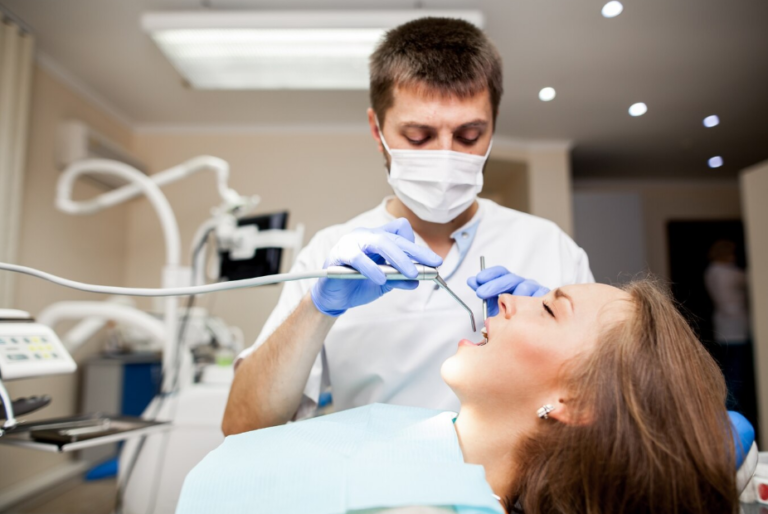Finding Your Ideal Dentist in Vancouver: A Comprehensive Guide
Finding a great dentist in Vancouver can feel like a big job, but it’s super important for keeping your mouth healthy. Your teeth and gums play a huge part in your overall health, so regular dentist visits are a must. Whether you’re new to the city or just looking for a change, this guide will help you figure out what to look for in a good dental provider right here in Vancouver.
Key Takeaways
- Knowing the different dental services available helps you pick the right dentist in Vancouver for your specific needs.
- Dealing with common dental problems early on can prevent bigger issues down the road.
- Checking a dentist’s background and looking at their clinic helps you make a good choice.
- Regular check-ups and cleanings are key for keeping your teeth and gums healthy for a long time.
- Being ready for dental emergencies means you can act fast if something unexpected happens.
Understanding Dental Services in Vancouver
General Dentistry Essentials
General dentistry is like the foundation of keeping your mouth healthy. It covers all the basic stuff you need to maintain good oral health. Think of it as your regular check-ups and maintenance. This includes:
- Regular check-ups: Catching problems early is key.
- Dental cleanings: Getting rid of plaque and tartar.
- Fillings: Fixing those pesky cavities.
- Basic procedures: Addressing common dental issues.
General dentists are your first line of defense. They make sure everything is in good shape and can refer you to specialists if needed. It’s all about keeping your teeth and gums healthy for the long haul.
Cosmetic Enhancements for Your Smile
Want a brighter, more confident smile? Cosmetic dentistry is where it’s at. It’s not just about looks; it can also boost your self-esteem. Here are some popular options:
- Teeth whitening: Getting rid of stains and brightening things up.
- Veneers: Covering up chips, cracks, and discoloration.
- Dental bonding: Repairing minor imperfections.
- Smile makeovers: A complete transformation for a dazzling smile.
Cosmetic dentistry can really make a difference in how you feel about your smile. It’s worth exploring if you’re looking for a confidence boost.
Specialized Dental Care Options
Sometimes, you need more than just the basics. That’s where specialized dental care comes in. Here are a few examples:
- Orthodontics: Straightening teeth with braces or Invisalign.
- Oral surgery: Extractions, implants, and other surgical procedures.
- Periodontics: Treating gum disease and maintaining gum health.
- Endodontics: Root canals and other treatments for the inside of your teeth.
Specialized care is there for when you have specific issues that need extra attention. Don’t hesitate to see a specialist if your general dentist recommends it. They have the skills and knowledge to handle more complex problems.
Addressing Common Dental Concerns
Managing Tooth Decay and Cavities
Okay, so tooth decay and cavities. Everyone deals with them, right? It’s basically when the enamel on your teeth gets eaten away by acid, which is made by bacteria that love sugar. The best way to fight this is to brush, floss, and watch what you eat.
Here’s a quick rundown of what might happen if you get a cavity:
- Small Cavity: Filling (the dentist cleans out the decay and fills the hole).
- Larger Cavity: Maybe a crown (a cap that covers the whole tooth).
- Really Bad Cavity: Root canal (they clean out the inside of the tooth and fill it).
Honestly, prevention is way easier than dealing with any of that. Regular check-ups can catch problems early, and fluoride treatments can help strengthen your enamel. Plus, cutting back on sugary drinks and snacks makes a huge difference.
Treating Gum Disease Effectively
Gum disease, or periodontal disease, is something you really don’t want to mess with. It starts with gingivitis (red, swollen gums that bleed easily) and can turn into periodontitis, which can cause bone loss and eventually tooth loss. Not fun.
Here’s what the dentist might do:
- Deep Cleaning (Scaling and Root Planing): They scrape off plaque and tartar from below the gum line.
- Antibiotics: To kill the bacteria causing the infection.
- Surgery: In severe cases, they might need to do surgery to repair the damaged tissue.
| Treatment | Description
Solutions for Missing Teeth
Missing teeth can be a real pain, not just for your smile, but also for your overall oral health. They can affect your bite, make it harder to eat, and even cause your other teeth to shift. Luckily, there are a few good options for replacing them.
- Dental Implants: These are like artificial tooth roots that are surgically placed into your jawbone. A crown is then attached to the implant. They’re super stable and can last a lifetime.
- Dental Bridges: A bridge fills the gap created by a missing tooth by anchoring a false tooth to the adjacent teeth. They’re less expensive than implants but might require some filing down of the neighboring teeth.
- Dentures: These are removable appliances that can replace multiple missing teeth. They’re the most affordable option but can sometimes feel bulky or uncomfortable.
Choosing the right solution depends on your individual needs and budget. Talk to your dentist about the pros and cons of each option to figure out what’s best for you.
Selecting Your Ideal Dentist in Vancouver
Finding the right dentist can feel like a big task. It’s not just about someone who cleans your teeth; it’s about finding a healthcare provider you trust and feel comfortable with. In Vancouver, there are many dentists, so it’s important to know what to look for.
Evaluating Dentist Credentials and Experience
First, check the dentist’s qualifications. Make sure they are licensed and in good standing with the relevant dental boards. Look into their education and how long they’ve been practicing. Experience matters, but so does staying up-to-date with the latest techniques. It’s a good idea to see if they have any specializations or advanced training in areas that are important to you, like cosmetic dentistry or implant surgery.
Considering Clinic Environment and Technology
The clinic itself can tell you a lot about the dentist. Is it clean and well-maintained? Does the office seem modern and equipped with current technology? Things like digital X-rays, intraoral cameras, and computer-aided design/computer-aided manufacturing (CAD/CAM) systems can show that the dentist is committed to providing quality care. A comfortable and welcoming environment can also ease any anxiety you might have about going to the dentist.
Patient Testimonials and Referrals
What are other people saying about the dentist? Online reviews and testimonials can give you insight into the patient experience. Don’t just look at the star rating; read the comments to see what people liked or didn’t like. Ask friends, family, or your general practitioner for referrals. Personal recommendations can be very helpful in finding a dentist who is a good fit for you.
Choosing a dentist is a personal decision. Take your time, do your research, and don’t be afraid to ask questions. The right dentist will not only take care of your teeth but also make you feel confident and comfortable about your oral health.
The Importance of Regular Dental Check-ups
Preventive Care for Lasting Oral Health
Okay, so you might think skipping that dental appointment is no big deal, but trust me, it is. Regular check-ups are like hitting the reset button for your mouth, keeping everything in tip-top shape. It’s not just about avoiding cavities; it’s about setting yourself up for a lifetime of healthy smiles. Think of it as preventative maintenance for your teeth. You wouldn’t skip oil changes on your car, right? Same deal here.
- Keeps plaque and tartar at bay.
- Detects early signs of oral cancer.
- Helps prevent gum disease.
I used to think dental visits were just a money grab, but after dealing with a nasty tooth infection, I realized how wrong I was. Now, I make sure to go every six months, no matter what. It’s worth it for the peace of mind alone.
Early Detection of Dental Issues
Early detection is seriously key. Dentists can spot problems way before you even notice them. We’re talking about things like tiny cavities, the beginning stages of gum disease, and even potential issues with your bite. Catching these things early means simpler, less expensive treatments down the road. Plus, it saves you from a whole lot of pain and discomfort. It’s like finding a small leak in your roof before it turns into a major flood.
- Identifies small cavities before they become big problems.
- Detects early signs of gum disease.
- Screens for oral cancer.
Professional Cleanings and Examinations
Brushing and flossing at home are great, but they only go so far. A professional cleaning gets rid of all that stubborn plaque and tartar that your toothbrush just can’t reach. Plus, your dentist will give your mouth a thorough examination, checking for any potential problems and offering personalized advice on how to keep your teeth and gums healthy. It’s like getting your car detailed – it just feels so much cleaner afterward!
| Procedure | Benefit |
| Scaling | Removes plaque and tartar |
| Polishing | Smooths tooth surfaces |
| Fluoride Treatment | Strengthens enamel, prevents decay |
Removes stubborn plaque and tartar.- Provides a thorough examination of your mouth.
- Offers personalized advice on oral hygiene.
Navigating Emergency Dental Situations
Dental emergencies always seem to happen at the worst times, right? Knowing what to do can really make a difference in saving a tooth or minimizing damage until you can get to a dentist in Vancouver. I know it’s stressful, but being prepared helps a lot.
Immediate Steps for Dental Emergencies
Okay, so something just happened. First, stay calm. Seriously, it’s easier said than done, but freaking out won’t help. Then:
- Assess the situation: What exactly happened? Is there bleeding? How severe is the pain?
- Control any bleeding: Use clean gauze and apply pressure to the area.
- Call your dentist: Explain the situation clearly and ask for immediate advice or an emergency appointment. If your regular dentist isn’t available, find an emergency dental clinic in Vancouver.
It’s a good idea to have your dentist’s number saved in your phone and know the location of the nearest 24-hour dental clinic. Preparation is key.
Handling Knocked-Out Teeth
This is one of the scariest dental emergencies, but quick action can save the tooth. Here’s what to do:
- Handle the tooth carefully: Pick it up by the crown (the part you chew with), not the root.
- Rinse gently: Use water to clean off any dirt, but don’t scrub it.
- Try to replant it: If possible, gently push the tooth back into its socket. Make sure it’s facing the right way.
- Keep it moist: If you can’t replant it, put the tooth in milk or saliva. This keeps the cells alive.
- Get to a dentist ASAP: Time is super important here. The sooner you get to the dentist, the better the chance of saving the tooth.
Addressing Severe Tooth Pain and Abscesses
Severe tooth pain is no joke, and it could signal a serious infection. An abscess is a pocket of pus caused by a bacterial infection, and it needs immediate attention. Here’s what to do:
- Rinse with warm salt water: This can help reduce inflammation and kill some bacteria.
- Take over-the-counter pain relievers: Ibuprofen or acetaminophen can help manage the pain.
- Don’t ignore swelling or fever: These are signs of a serious infection that needs antibiotics.
- See a dentist immediately: An abscess can spread to other parts of your body, so don’t wait. Your dentist might need to drain the abscess and prescribe antibiotics. IV sedation in Vancouver might be an option to make the procedure more comfortable.
Financial Considerations for Dental Care
Understanding Dental Insurance Coverage
Okay, let’s be real, figuring out dental insurance is about as fun as a root canal. But understanding your coverage is super important to keep costs down. Most plans have yearly maximums, deductibles, and waiting periods for certain procedures. It’s a good idea to call your insurance company and ask them to explain exactly what’s covered and what isn’t. Also, double-check if your dentist is in-network, because out-of-network costs can really add up. Some dental offices will even help you with the paperwork, which is a huge plus.
Payment Plans and Financing Options
Not everyone has perfect dental insurance, and sometimes you need work done that isn’t fully covered. That’s where payment plans and financing come in. Lots of dental offices offer their own payment plans, breaking down the cost into smaller, more manageable monthly payments. Some also work with third-party financing companies that specialize in healthcare costs. These options can make bigger procedures, like implants or orthodontics, way more accessible. Just make sure you read the fine print and understand the interest rates and terms before you sign up for anything.
Cost-Effective Dental Solutions
Taking care of your teeth doesn’t have to break the bank. There are definitely ways to keep costs down.
- First, focus on preventative care. Regular check-ups and cleanings can catch problems early, before they turn into expensive procedures.
- Second, ask your dentist about different treatment options. Sometimes there are less expensive alternatives that are still effective.
- Third, consider community dental clinics or dental schools. They often offer lower prices, and the students are supervised by experienced dentists.
It’s easy to put off dental work because of the cost, but ignoring problems will only make them worse (and more expensive) in the long run. Talk to your dentist about your budget and see what options are available. A healthy smile is worth the investment!
Maintaining Optimal Oral Hygiene at Home
Effective Brushing and Flossing Techniques
Okay, so brushing and flossing might seem super basic, but honestly, most people aren’t doing it right. The key is consistency and technique. You gotta brush at least twice a day, and floss once. I know, it’s a pain, but trust me, your gums will thank you. When brushing, use a soft-bristled toothbrush and gentle, circular motions. Don’t scrub like you’re trying to sand down a piece of wood! For flossing, make sure you get between each tooth and gently scrape along the sides.
Here’s a quick checklist:
- Brush twice a day (morning and night).
- Floss once a day (before bed is good).
- Use a soft-bristled toothbrush.
- Replace your toothbrush every 3 months.
Dietary Habits for Healthy Teeth
What you eat seriously impacts your teeth. Sugary drinks and snacks are like a party for the bacteria in your mouth, which leads to cavities. Try to limit your sugar intake and opt for healthier choices. Crunchy fruits and veggies can actually help clean your teeth as you eat them. Also, drink plenty of water to keep your mouth hydrated and wash away food particles.
Here are some foods to consider:
- Apples
- Carrots
- Celery
- Cheese
It’s easy to forget how much sugar is in everyday foods and drinks. Read labels carefully and be mindful of your consumption. Small changes can make a big difference in your oral health.
Recommended Oral Care Products
There are a ton of oral care products out there, and it can be overwhelming to choose the right ones. Look for toothpaste with fluoride, as it helps strengthen your enamel. Mouthwash can also be helpful for killing bacteria and freshening your breath, but it shouldn’t replace brushing and flossing. If you have sensitive teeth, consider using a toothpaste specifically designed for sensitivity. And don’t forget about interdental brushes or water flossers for those hard-to-reach spots.
Here’s a quick guide:
- Fluoride toothpaste: Strengthens enamel.
- Mouthwash: Kills bacteria, freshens breath.
- Interdental brushes/water flossers: Cleans between teeth.
- Tongue scraper: Removes bacteria from the tongue.
Wrapping Things Up
So, there you have it. Picking a good dentist in Vancouver doesn’t have to be a huge headache. It’s really about finding someone who fits what you need. Think about what’s important to you, like if they’re close by or if they offer certain services. Don’t forget to ask around, read some reviews, and maybe even pop in for a quick chat before you commit. Taking care of your teeth is a big deal for your overall health, so take your time and pick a place where you feel comfortable. You’ll be glad you did.
Frequently Asked Questions
What’s the difference between a general dentist and a cosmetic dentist?
A general dentist takes care of your basic dental needs, like check-ups, cleanings, and fixing cavities. A cosmetic dentist, on the other hand, focuses on making your smile look better. They do things like teeth whitening, veneers, and fixing chipped teeth to improve how your smile appears.
How can I pick the right dentist for me?
When looking for a dentist, you should check their training and how much experience they have. Also, think about the clinic’s feel and if they use modern tools. Reading what other patients say and getting recommendations from friends or family can also be very helpful.
Why are regular dental visits so important?
Regular dental check-ups are super important because they help catch small problems before they become big, painful ones. Your dentist can spot issues like cavities or gum disease early, and professional cleanings keep your teeth healthy and bright.
What should I do if I have a dental emergency?
If you have a dental emergency, like a knocked-out tooth or really bad pain, you should call your dentist right away. If it’s after hours, many clinics have an emergency number or you might need to go to an urgent care center that handles dental emergencies.
How do I figure out what my dental insurance covers?
Many dental offices work with different insurance plans. It’s a good idea to call the dental office and your insurance company before your visit to understand what your plan covers and what you’ll need to pay yourself. Some clinics also offer payment plans.
What’s the best way to take care of my teeth every day?
To keep your teeth healthy at home, brush your teeth twice a day with fluoride toothpaste and floss once a day. Try to eat healthy foods and limit sugary drinks. Also, use mouthwash if your dentist suggests it.






